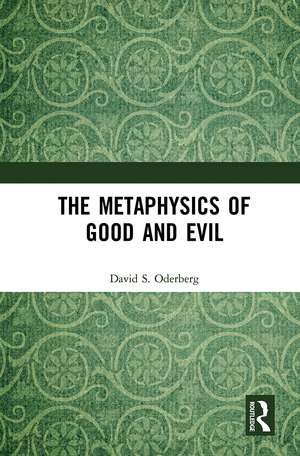The Metaphysics of Good and Evil
Autor David S. Oderbergen Limba Engleză Paperback – 13 dec 2021
Key Features:
- Offers a comprehensive defence of a venerable metaphysical theory, conducted using the concepts and methods of analytic philosophy.
- Revives a much neglected approach to the question of good and evil in their most general nature.
- Shows how Aristotelian-Thomistic theory has more than historical relevance to a fundamental philosophical issue, but can be applied in a way that is both defensible and yet accessible to the modern philosopher.
- Provides what, for the Scholastic philosopher, is arguably the only solid metaphysical foundation for a separate treatment of the origins of morality.
| Toate formatele și edițiile | Preț | Express |
|---|---|---|
| Paperback (1) | 326.55 lei 3-5 săpt. | +22.67 lei 10-14 zile |
| Taylor & Francis – 13 dec 2021 | 326.55 lei 3-5 săpt. | +22.67 lei 10-14 zile |
| Hardback (1) | 766.12 lei 6-8 săpt. | |
| Taylor & Francis – 2 dec 2019 | 766.12 lei 6-8 săpt. |
Preț: 326.55 lei
Nou
Puncte Express: 490
Preț estimativ în valută:
62.48€ • 65.41$ • 51.70£
62.48€ • 65.41$ • 51.70£
Carte disponibilă
Livrare economică 15-29 martie
Livrare express 04-08 martie pentru 32.66 lei
Preluare comenzi: 021 569.72.76
Specificații
ISBN-13: 9781032239415
ISBN-10: 1032239417
Pagini: 240
Ilustrații: 4 Illustrations, black and white
Dimensiuni: 152 x 229 x 13 mm
Greutate: 0.45 kg
Ediția:1
Editura: Taylor & Francis
Colecția Routledge
Locul publicării:Oxford, United Kingdom
ISBN-10: 1032239417
Pagini: 240
Ilustrații: 4 Illustrations, black and white
Dimensiuni: 152 x 229 x 13 mm
Greutate: 0.45 kg
Ediția:1
Editura: Taylor & Francis
Colecția Routledge
Locul publicării:Oxford, United Kingdom
Cuprins
Introduction Part I A Theory of Good as Fulfilment 1. The basic theory: appetites and fulfilment 2. Developing the Scholastic conception of goodness 3. A case for inorganic goodness 4. The good in the living Part II A Theory of Evil as Privation 5. In defence of the privation theory 6. Evil and truthmaking 7. Evil as cause and effect 8. The reality of evil
Notă biografică
David S. Oderberg is Professor of Philosophy at the University of Reading, England. He is the author of many articles in metaphysics, ethics, philosophy of religion, and other subjects. His books include Moral Theory: A Non-Consequentialist Approach (2000), Applied Ethics: A Non-Consequentialist Approach (2000) and Real Essentialism (2007). He is also the editor of several collections on ethics, logic, and metaphysics. Prof. Oderberg edits Ratio, an international journal of analytic philosophy.
Recenzii
"Oderberg’s work provides theologians the clarity necessary to avoid spouting platitudes or nonsense when posed the question: if evil is, in itself, nothing but a lack of being, how can evil wreak so much damage? Oderberg’s response is that the theory on which evils are privations of being does not entail that evils are not real. Despite sin and evil remaining mysterious features of the world, then, the first half of the book and the concluding chapter on the reality of evil would be fruitful to anyone looking to understand or defend classical Christian reflection concerning the mysterium iniquitatis." - Fr. James Dominic Rooney, OP, Religious Studies Review
Descriere
The first, full-length contemporary defence, from the perspective of analytic philosophy, of the Scholastic theory of good and evil – the theory of Aristotle, Augustine, Aquinas, and most medieval and Thomistic philosophers.
